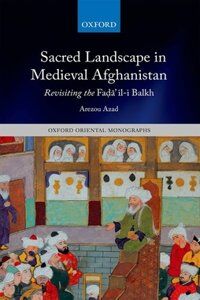Only logged in customers who have purchased this product may leave a review.
Sale!
Sacred Landscape in Medieval Afghanistan (Hardback) | Released: 14 Feb 2014
By: Arezou Azad (Author) Publisher: Oxford University Press, USA33.01% Off ₹6,743.00
You save ₹3,322.00
This book is about a sacred place called Balkh, known to the ancient Greeks as Bactra. Located in the north of today’s Afghanistan, along the silk road, Balkh was holy to many. The Prophet Zoroaster is rumored to have died here, and during late antiquity, Balkh was the home of... Read More
In stock
Ships within 1-2 Business Days
100% Orginal Books
Easy Replacement
Certified product
Secure Checkout
On time delivery
Author:
Arezou Azad
Publisher Name:
Oxford University Press, USA
Language:
English
Binding:
(Hardback)
About The Book
This book is about a sacred place called Balkh, known to the ancient Greeks as Bactra. Located in the north of today's Afghanistan, along the silk road, Balkh was holy to many. The Prophet Zoroaster is rumored to have died here, and during late antiquity, Balkh was the home of the Naw Bahar, a famed Buddhist temple and monastery. By the tenth century, Balkh had become a critical center of Islamic learning and early poetry in the New Persian language that grew after the Islamic conquests and continues to be spoken in Iran, Afghanistan and parts of Central Asia today. In this book, Arezou Azad provides the first in-depth study of the sacred sites and landscape of medieval Balkh, which continues to exemplify age-old sanctity in the Persian-speaking world and the eastern lands of Islam generally. Azad focuses on the five centuries from the Islamic conquests in the eighth century to just before the arrival of the Mongols in the thirteenth century, the crucial period in the emergence of Perso-Islamic historiography and Islamic legal thought. The book traces the development of 'sacred landscape', the notion that a place has a sensory meaning, as distinct from a purely topographical space. This opens up new possibilities for our understanding of Islamisation in the eastern Islamic lands, and specifically the transition from Buddhism to Islam. Azad offers a new look at the medieval local history of Balkh, the Fada'il-i Balkh, and analyzes its creation of a sacred landscape for Balkh. In doing so, she provides a compelling example of how the sacredness of aplace is perpetuated through narratives, irrespective of the dominant religion or religious strand of the time.About the Author: Arezou Azad is Lecturer in Medieval History at the University of Birmingham. She is the founder and co-Director of the Balkh Art and Cultural Heritage project, funded by the Leverhulme Trust and based at the University of Oxford. She received her D.Phil. from the University of Oxford in 2010. She has published several articles on medieval Balkh and the Fada'il-i Balkh, the city's earliest surviving local history of which she is preparing a revised Persian edition and English translation. Prior to joining academia, she served as a peacekeeper and development worker for the United Nations and non-governmental organizations in a number of countries, including Bosnia-Herzegovina, Brazil, and Timor-Leste.


Reviews
There are no reviews yet.